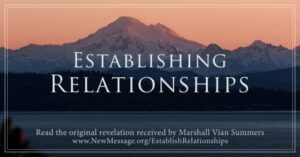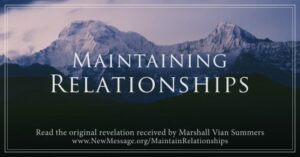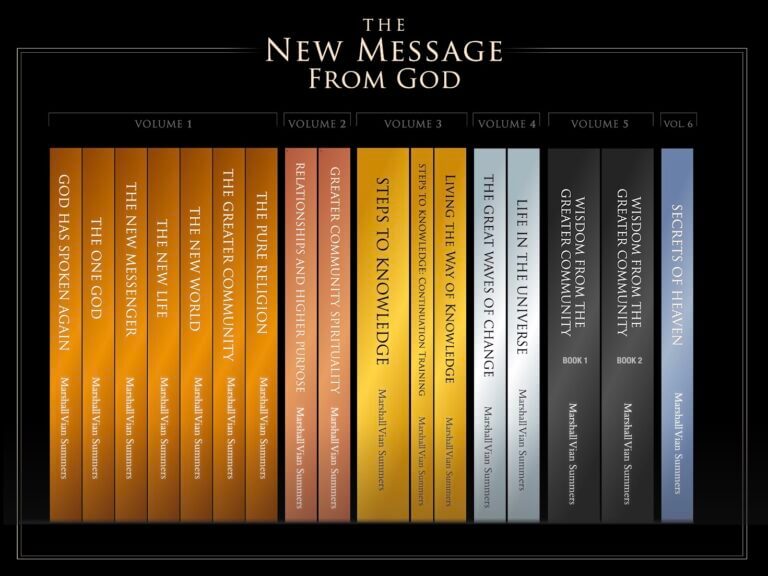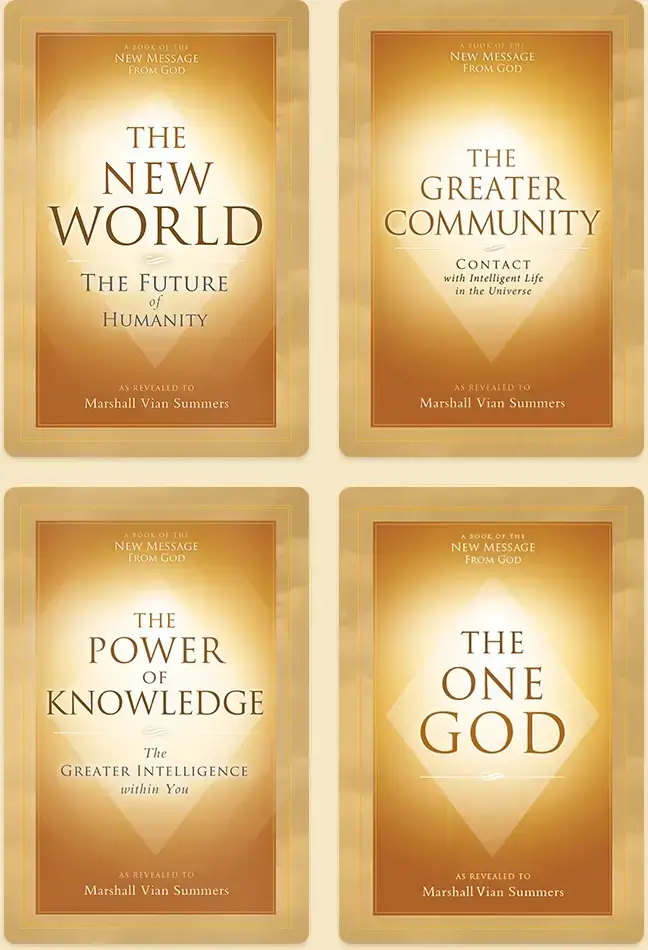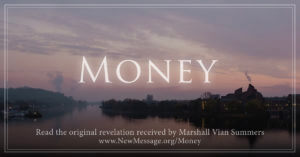
Marshall Vian Summers
on April 17, 1992
in Boulder, Colorado
Money is a subject that is on most people’s minds. It is a subject that will naturally arise when you consider attempting something of greater importance and magnitude in life. So, what about money?
First of all, as with everything else, you must gain a new relationship with this resource and learn to treat it as a resource. In order to have a new relationship with yourself and with life, you must re-evaluate your relationship with many important specific elements that make up your practical existence in the world—your relationship with love, your relationship with friends, your relationship with your mind and your body and your relationship with money.
Money is a fact of your life; you cannot escape it. You will have to contend with it at least to some degree, even if you assume a very ascetic existence. It is a practical necessity in your life. It presents its own problems, many of which you can avoid and some of which are unavoidable. Money is a resource to which people give great meaning and significance.
Money, then, is not the problem. It is the use of money. Here you must look at your motives, your nature and your preparation. Your motives with money will determine how you perceive it, what qualities you attribute to it, how you arrange it in the priorities of your life and what you attempt to do with it. Your nature will determine your predispositions and will color to a very great degree how you perceive money and what role you feel it will play and should play in your life. Your preparation is very important because this will determine how mature you are in your dealing with this resource and how and for what purpose you attempt to use it.
Therefore, there is your motive, there is your nature and there is your preparation. The more prepared you are and the further advanced you are in The Way of Knowledge, the more you will use money as a resource and not attempt to use it to build your survival or well-being, your position in society or any advantages you are seeking to claim over others.
Here we come back again to motive. To look at money, you must look at yourself and ask some very important questions. In fact, eventually you will have to ask the most important questions, which are, “Why am I here? What do I serve? What do I have to give?” and “What do I want to communicate?” Until you reach these fundamental questions about your life, you will use money for a mixture of reasons, which will make your perception and understanding of it very confusing, and at times even contradictory. You will use it for survival; you will use it for pleasure; you will use it to impress others; you will use it to acquire things; you will use it to get rid of things. Money is a resource that serves your motives. It demonstrates what you value.
Some people make great claims about the meaning and value of money. Others deny it altogether, thinking that it is an evil substance, something that corrupts or leads one astray, entangling one in dangerous and unfortunate circumstances. Money is given magical powers by some and demonic powers by others. Some consider it to be a divine substance; others consider it to be something that can only corrupt a person’s well-being and integrity.
However, money is not the problem, for money is merely a means of conveyance to carry out what one values and what one intends to do in life. Here it is the nature of the individuals and their own maturity that will determine their motives and what they value. Money will be used to serve this. It is wise, then, to consider money to be a neutral substance, at least as far as you are concerned. Here you must understand what values you place upon it. You cannot simply claim, “Money is neutral.” You must understand how you view it presently and undertake to change this view by withdrawing the significance that was formerly given to it and by recognizing money as an important resource that can be used for a variety of purposes.
Now, an important thing to remember here is that other people will continue to give money an inordinate amount of significance and attribute great powers to it, either divine or demonic. Therefore, even if you consider money to be a neutral substance, you must recognize that the rest of the world does not, and you will have to deal with it with great care and consideration. Money represents power in the world. It is a power that has claimed many lives and will continue to do so. Therefore, even if you feel that your relationship with money has finally reached a basis of true understanding, you will still have to deal with it very carefully in the world.
Money is an important resource because it can fuel the accomplishment of many valuable things. Therefore, it is unwise to think that it is meaningless or without merit. Again, it is in whose hands it is placed, what purpose it serves and what values it demonstrates that are the important considerations. You will need it to accomplish anything. You will need it to provide for yourself because money is a means of conveyance for what is needed to live in the world. It is meant to be given and received.
Therefore, when we speak about money, we are addressing a very confused and entangled subject fraught with a great deal of significance that is attributed to it—tremendous fear, misunderstanding, desires and ambitions. Some of these associations are recognized and acknowledged while others are secretive and cast their influence without an individual’s recognition. It is not a simple subject. In many ways, money represents the confusion of mind that is the causative agent and the natural by-product of much of the suffering and misery in the world. It is the result of people living without Knowledge.
When we speak of your relationship with money, we are speaking about your condition of life. We are talking about your motives, which represent what you value and what you are trying to do. This is all based upon who you think you are and what you think you must do in life to secure well-being for yourself. So, when we speak of money, we speak of you in the deepest kind of way.
Re-evaluating your relationship with money is a process of introspection and self-analysis. If this can be carried out without condemnation and as objectively as possible, great insight can be derived and an important understanding can be established that will enable you to deal far more wisely with yourself, with the necessary resources in life, such as money, and with other people’s approach to you.
Now I will give some general ideas about how to utilize money effectively. The starting point here is to recreate your relationship with money. For this, you need to know where you stand with it currently. Your understanding of this must be based upon a very honest evaluation. In other words, you must recognize how you really stand with it—not how you want to stand with it or how you think you should stand with it, but how you really stand with it. If there is fear and anxiety surrounding money, this must be acknowledged. If you are greedy or selfish with money, this must be acknowledged. If you avoid money and do not want to deal with it, thinking it is too powerful or too confusing, this must be acknowledged. Here you must have a realistic starting point. Otherwise, you cannot proceed. You cannot re-evaluate anything unless you know your current position and use this as a starting point.
Now, for most people, too much or too little money is not good. Remember, money is a resource. If you have too little of it, you are always in need of it and it gains too much significance in your life. If you have too much of it, then you spend your life protecting it, managing it and keeping it away from other people. Indeed, in this situation, other people’s approach to money is a constant interference and can endanger your life and make money far more of a burden than it would be otherwise. That is why the rich are generally dominated by their relationship with money. Yet, the poor are also dominated by their relationship with money.
Here it is important that one seek to develop a meaningful balance. How much is enough? What degree of ownership of money will enable it to be a useful resource without becoming a dominating influence? Here you must determine what you know rather than what you want. If you can follow what you know, this will give you real insight and will balance your relationship with money. What you want here will always exceed your needs. Much of what people want is based upon their present fear of loss, their past experience of loss and their anxieties about future loss. They want to buffer themselves against the harsh reality of life at the expense of their Knowledge, their sense of themselves and their honesty.
Therefore, the first fundamental question to ask yourself is, “Where do I stand in my relationship with money at this moment?” To answer this question, you need to review your past experiences and to view yourself with as much objectivity as possible. Here you will need to ask yourself, “What meaning do I give money? What purpose does money serve for me? How can I use money effectively to support myself and to contribute to the world?” This is all part of the question, “Where do I stand in my relationship with money at this moment?”
The second important question to ask yourself is, “How much money do I really need?” To be able to respond to this question effectively, you must have a deeper sense and experience of knowing within yourself. Otherwise, your wants will dictate the answer and once again you will be bound to try to fulfill your goals and expectations based upon your desires, which will once again set you in the wrong relationship with money.
How much is enough? If you seriously take on this question, you must go to the third important question, which is, “What am I trying to accomplish?” This, of course, is a very important question. In fact, it is one of the essential questions. “What am I trying to accomplish?” The answer to this question will determine how much money you need and what kind of relationship with money you will have to have. Some people need very little money to carry out their real contribution in the world, just enough to keep them alive—food, shelter, clothing, a little bit for recreation and a little bit for the future. They don’t need a great deal. Others will need more. Perhaps they are going to raise a family. Perhaps they are going to start some kind of business enterprise. Perhaps they are going to become an advocate for something important in the world. Their need for money here is greater, for they must provide for other people. They must provide for their business establishment. Or they must provide for their advocacy in the world.
The range of need can vary considerably. If you are trying to raise money for an important activity in life to support a mission or an advocacy, then you may need far more than you would personally require, yet you do not want to be encumbered by money. Therefore, the personal requirement for money varies greatly, even for those who are learning to live a real and genuine life.
When you ask the question, “What am I trying to accomplish?” you must always realize that the answer to this question is something that will develop and change. But your answer must be solid enough that you can stand upon it and use it as a reference. It must be a foundation, even as it evolves and changes through the process of your life. It cannot merely be a form of speculation, a set of hopeful fantasies or some magnificent personal goals. It must be something very solid.
Again, you have to assess where you are now. If you establish that you are going to do something that is far beyond your reach and current preparation, then your assessment of what you are trying to accomplish will not be useful to you. Therefore, the answer to this question should reflect where you are now and what you are doing now. Perhaps you are working towards something greater that you understand or, as is often the case, something that you don’t understand. But you still are where you are now, and you have a set of problems to solve in life now. The things you know you must do, some of which you are doing and some of which you are neglecting or denying, are what you have to do now. So, this is not an ultimate question that only the future can answer. It is a practical question for now.
Determining what you must accomplish will help you to determine what your motives are. If you recreate your motives based upon this understanding, then you will be able to recast your relationship with money. People always have motives, but they are rarely responsible for their creation. They just accept them from the environment around them. They absorb them from the cultural values that they share with others. They go along with what everyone else thinks and wants and what everyone else is trying to be, do and have, and so forth. Here you have an opportunity to re-establish your definition of yourself based upon what is known and what is real for you.
Money is a resource to serve a purpose. What is the purpose it is serving? Well, you may say that money is necessary to live in the world. You have to eat and have shelter and have clothes. Yes, but this does not account for a great deal of people’s investment and involvement with earning, protecting and spending money. You could live a very simple life, have enough to eat, have adequate shelter, good clothing, and a little leftover. People around the world are living on a fraction of what you are living on. And many of them are not suffering for it. But when you want to be more than you are, then it becomes an emphasis of constantly having more and acquiring more, and then you feel that you have to protect what you have already, and you have to maintain it. That requires more and more money. So, having more becomes an ever-increasing emphasis, and money becomes a greater and darker burden and shadow for you.
Even the rich sometimes feel they can barely keep up with things financially. Their expenditures are so great that they have to work harder and spend more time protecting their money, more time investing it, securing it and preventing its loss or dissipation. But for a purely subsistence, survival level, you need very little money. This is obvious when you think about it, but then you may say, “I would not be happy living such a simple life.” Many people will say that. But I say, why not? What are you trying to accomplish? Do you simply want to be more comfortable, have more personal diversions, have more things to play with, always have a bigger house or better house, more clothes? More, more, more. Here money becomes a great burden for you, and you cannot use it objectively. It is feeding a set of desires, ambitions and self-imposed requirements that may have little to do with why you are in the world or what you are really trying to accomplish.
Some people go hot and cold in their relationship with money. They get hot with it, and they want to have it, and they are going to earn it, and they are going to secure it, and they are going to make a lot of it, and it is going to work for them, and they have it all figured out. Then they begin to realize over time that the investment is consuming more and more of their attention, their energy, their focus, their well-being and their time. It is eroding their relationships. It is dominating their focus and priorities. Then, they turn away from money saying, “I am going to do something very different.” So, they try to live without money or they deny it. But this is how a person tries to reposition himself or herself with something that has become an addiction. Look at the behavior of the person engaged in addiction. They are going hot and cold with their addiction. They are giving themselves to it with all kinds of explanations and justifications, and then they are denying it and claiming that they are going to free themselves. Then they say, “Oh, I can’t do it. Why bother?” And they give in once again.
Money is a tool. Beyond meeting basic survival needs, it is a tool. What purpose does it serve? What are you trying to accomplish with it? Here you must not only look at your own goals, priorities and values, you must look at what the world is requiring. If you are sincerely seeking to realize a greater purpose in life, do not look to yourself alone. Look to yourself and to the world. The world says, “I need this, and I need this, and I need this.” Which need can you fulfill? Indeed, it takes the recognition of real need and suffering in the world to bring people out of their intoxication with what they want and what they don’t want—their self-absorption.
It sometimes takes a very rude awakening. Either something very powerful happens to you that shakes you out of this dream state you live in regarding what you want and what you must have and all this, or you become engaged with someone whose needs are so real and so much more genuine than yours that it shakes you out of this fog. This dream state is really a form of intoxication. For example, you might be considering buying your next pleasurable object or a new wardrobe of clothes or a new car, and then you meet someone who needs money for food or who has a medical problem that they cannot attend to because they do not have the financial resources. Their need is so much more legitimate and real and compelling than yours. You are spending a fortune on trivia, and they need money for basic and important things. It takes this kind of encounter with life to shake you out of your own self-absorption and to make you feel like you have something important to give.
People who are only committed to their self-gratification are so profoundly unhappy and so driven and so addicted that though they can demonstrate beauty, power, influence and sophistication, as human beings they are really pathetic. They have invested in that which cannot yield anything of real merit for them or for others.
The question here is not whether one has money or not. The question is, “Is money serving a real need? Is money being a useful resource?” Look at your society. The youth want money for fun and play. The elderly want money to meet their great medical needs and, if they can afford it, more fun and play. There is all this emphasis on fun and play.
So, when we deal with money, we deal with purpose. When we deal with purpose, we deal with what people value and what people are aware of. Bringing people back into a real engagement with life, renewing their sense that they are here to contribute something, to give something of value and to leave an important legacy—that is the emphasis. Unless that is the emphasis, money will be a problem and not a solution. Money will be a god or a demon, a curse or a benediction. It will be imbued with magical and mystical powers, and people will be profoundly confused about what it is and what can be done with it.
Your needs are small. The world’s needs are great. When you come to this realization, then you will be in a position to give and to recognize what you have to give. It will be pulled out of you. Instead of going through life asking, “Who am I? What do I want? How can I be happy? What should I do? What shouldn’t I do?” you become a person who looks into the world and says, “I can’t do this, but I can do that. I feel I can help here. I can do something meaningful here.”
Do you want to experience real spirituality? Do you want to have meaningful relationships? Do you want to have a sense of direction in life? Do you want to have a sense of your own value? Then contribution must be your emphasis. Sickness in the mind is born of self-absorption. It is born of selfishness. When money serves this, it is part of the affliction. You only have to look about you to see the myriad demonstrations of this. Everyone is trying to have more, and yet they are feeling miserable, afraid to be with themselves, afraid to be with anyone else, afraid of stillness, afraid of silence, afraid of intimacy, and driven to have more and more and more, far beyond their legitimate needs.
In many of the discourses in this book, I have spoken of the condition of the world—what is changing in the world and the greater influences that are at work in the world today, which are determining the world’s evolution and are governing its overall direction. You cannot entertain these things if you are still entrenched in your own self—your wants, your needs, your fears. The answer is not there. The answer is to re-engage with life, with Wisdom, with Knowledge, with inner direction. Many people lose themselves in the affairs of the world, and this is common as well. This is not what I am speaking of. You must do your inner work and you must do your outer work. At a certain point, you cannot do any more inner work, so you must do your outer work. This means that you find a real need in the world and you work on meeting it.
As I have illustrated the greater movement of the world, you must come to realize that its needs are tremendous. People ask, “What is my calling?” and I say, “Look at the world.” They ask, “What is my purpose?” and I say, “Look at the world!” With big eyes! Not fearfully or fancifully, but with big eyes! Consider the world’s emergence into the Greater Community. Consider the need to reclaim the environment. Consider the immersion of cultures into one another. Consider all of the great and compelling needs of society. Which calls to you?
If you want to lose yourself in luxuries and pleasures, you will find no relief. Along with this, there will be guilt because you are wasting a great resource in the world. It is all right to have pleasure; it is all right to do fun things. But keep your sense of responsibility. You are here to contribute to the world. The world is not here to pamper you and make you secure. You will die. So, what are you going to do to make this life a meaningful experience? Have more fun? Take more vacations? Buy more things? If you think that that will meet your need, then go spend time with people who have more than you do. If you do this, you will certainly be convinced that this is not the way.
In nature, everything is useful. Nothing is wasted. Everything contributes to everything else. Nothing is squandered. Learn from your natural world. Re-engage with it. You will see. All creatures need certain things for their survival and well-being. But you do not see them laying up great treasures for themselves. All creatures in the world are vulnerable in the world. Beyond their protective instincts and the shelters they may provide for themselves, they are vulnerable to the world. They are engaged in the world.
Do not get lost in the idea that money is good or money is bad or that pleasure is good or pleasure is bad. This will always lead you astray. Come back to ask, “What must I do?” Here you look at your natural inclinations. You assess your natural abilities, and you look at the needs of the world. You will need to do very simple specific things, perhaps not seemingly related but still contributing and necessary to the world’s emergence into the Greater Community and the unification of human society. Find your role and fulfill it and you will find your fulfillment. There is no other way. If you want to know your value and your gift and your nature, this is the way. Trying to seek transcendental experiences to get out of the world, to get back to God, is not the way. God sent you here to do something, and yet you want to get back to God!
Being in the world is not simply being in a prison from which you must find an escape. You will not be in the world very long, so your escape is guaranteed. You are not sent here forever. You have come from someplace and are returning to someplace very different from the world. So, your escape is guaranteed. But can you have a sense of your Ancient Home while you are here?
The person who is healed is the one who gives and finds a place to give. If you know you have to give and have trouble finding a place to give, then start giving to something or someone that needs what you have. It does not have to be the ultimate place where you will give, but it is a starting point. You learn your gift by giving. You do not wait until the ultimate situation comes around, and then maybe you will give if it does not cost too much. You start giving now. There is no relief for neurosis or selfishness other than this. Here you do not give for your glory, even for your spiritual redemption. You give because you are needed. And you will find that place where you are genuinely needed and where you can genuinely give.
In the future, which will be your future, the needs of the world will become greater and more compelling and people will be forced to share the world’s resources with each other far more than they do now. They will be forced to share their heritage and what they know with each other. The rich will become poorer and the poor will need a great deal more. Many of the great inequities that you see now concerning people’s affluence will be balanced out because the resources will be diminished and the population will be greater. It will become increasingly inappropriate to have great personal wealth. Unless your role in life is to be a benefactor and you end up giving most of it away, it is inappropriate and will become increasingly so.
Remember, giving is not giving up. Giving is directing your resources and your attention to something that needs you. This is what produces well-being and advancement, and your giving will far exceed the specific need to which it is directed. It will enhance the mental environment. It will cast a wave of inspiration on others to give and to escape from their own tragedies.
The future that is your future will require more and more of you. This is good for you, though it will not be good for humanity if this need goes unmet. But it is good for you. It offers you the real possibility to redeem your true value, your true meaning and your true abilities. Your future means you will not be able to have all the things you want to have. If something you want is not appropriate, then you will know it. And if you commit yourself to it, you will carry with you a sense of guilt and irresponsibility that no one will be able to alleviate.
Having too much is as bad as having too little because you are out of balance and your relationship to life and the resources of life are not correct and require change. Being in the right relationship with money means being in the right relationship with your true objectives in life and being in the right relationship with the world around you. If you have too much, you will suffer. Likewise, if you have too little, you will suffer. Both situations require change and readjustment. Your Knowledge knows what is correct—in your relationship with money, with people and with life, and in all of the particulars that are involved within these categories. Being out of balance calls for readjustment, re-evaluation and a new application of yourself. In this light, the rich are as bad off as the poor. Yet, the poor have a greater possibility for happiness than the rich, for often the rich cannot be reached. They have given themselves much too much, and they are too indulged. Perhaps if they became extremely poor all of a sudden, they would be able to relive their life and to awaken and reassess their genuine needs.
Having too much or too little creates imbalance and requires a readjustment. Those who are wealthy and have realized the imbalance can commit themselves to giving their resources away, not to become poor but to become benefactors. The role of the rich is to be benefactors. There is no reason to become rich other than to become a benefactor. If it is your design and role in life to be a benefactor, then you will need a lot of financial resources, a small part of which you will need to carry on your own work and a small part of which you can assign to your pleasures and happiness. But the main focus in using this resource is to give to others and to enable others to give themselves. Why make those living in poverty more affluent? So that they can give! When the rich do not give, they do not set an example for this, and as a result their lives becomes decadent and self-destructive. Giving is what inspires people, and there must be many great examples here. For some, giving will require tremendous education. They must achieve a tremendous practical, academic education. For others, it will require a different kind of education, a different kind of sensitivity.
Money, like intelligence, is a resource. If it is used wisely and directed properly, it can be used for a greater spiritual purpose, which will give it real meaning and value. In reality, almost everyone in the world needs to adjust their relationship with money because they need to discover why they are here and what they are trying to accomplish. The answers to these questions are not static definitions; they are a growing realization. Even if you find the truth about your current situation, you will realize that the application of truth will need to be adjusted as you go along. Perhaps your need for money will become greater; perhaps it will become less—depending on what you are working on accomplishing. If you are building a hospital or replanting a forest, you will need quite a bit of money. Here you give others the opportunity to give and to assert true value both in their giving and in what they receive. Other people will simply need to care for the sick and the dying. They may not need as much money. Some will need to counsel. Some will need to build.
There are so many examples, too numerous to mention here. But it is necessary to reaffirm the idea that money is a useful tool to serve a real purpose. If it serves an unreal purpose, it will have an unreal meaning and will be a source of confusion and disability for people. The time for self-indulgent use of money is over. The time for contribution is now. Only this can establish for you a right relationship with money, with other people and with yourself.
Therefore, money is a vehicle to express a real purpose. In this, it finds its true value. Take this opportunity, then, to assess your current needs and determine as best you can what you are working on accomplishing now. Have this be based upon Knowledge and not simply upon your wish list. Then determine your real need for money. This will determine how much you must work in the world and what you must do to secure the resources that you need. If you ask for more than you need, you will work more than you need, and your life will be out of balance as a result. Sometimes you must make money for an important project, and you must work very hard for it for a period of time. But it is worth it. The question here is not whether it is hard or easy. It is whether it is correct. Here Knowledge is your guide, for within yourself you will know. When things are not right, you will feel it. You will know. When things are correct, you will feel it. You will know. And you need to be exposed both to things that are right and things that are not right in order to have this contrast. Then you can begin to sense or feel this greater part of yourself that knows, this vital reference point within yourself that we call Knowledge.
You will see much that is wrong in the world. Do not condemn it. Have it teach you to reflect on Knowledge within yourself. Have what is correct inspire you. Have what is incorrect reorient you to Knowledge and bring you back to Knowledge. The world contains both what is correct and what is not correct. Both can lead you to true relationship. Having a true relationship with money is the same as having a true relationship with another and having a true relationship with yourself. If it serves a real purpose and meets a real need, then its expression will be real and its value will be confirmed. Such is the truth in relationships of all kinds.

